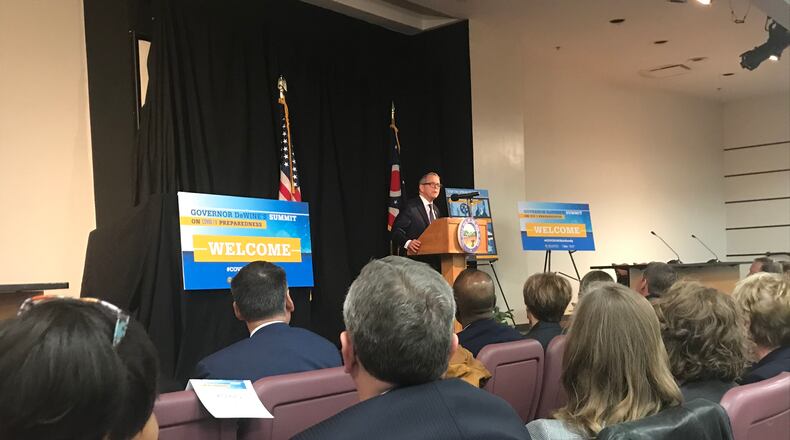Dr. Amy Acton, director of the Ohio Department of Health, said the test kits arrived Thursday from the Centers for Disease Control and Prevention. She said the Ohio Department of Health will be ready to start testing by this weekend after a calibrating process. The kits mean results will be available within one or two days for people with cases under investigation.
“Having tests available in Ohio is going to make that a much more rapid response for us,” said Clark County Combined Health District Commissioner Charles Patterson.
MORE: After Seattle COVID-19 death, Dayton doctor says good hygiene is best prevention
While the virus is not known to be in Ohio yet, state and local officials gathered in Columbus Thursday to work on a plan to keep residents healthy. The hundreds who gathered at the Ohio Department of Transportation headquarters included public health officials, state agency administrators and a range of other professions.
“One of our missions is to really keep Ohio residents informed and give them the best information we can,” Gov. Mike DeWine said at the start of the conference.
Gov. Mike DeWine also joined 38 governors today in sending a letter to Congressional leaders in support of the Coronavirus Preparedness and Response Supplemental Appropriations Act.
The letter praised the House of Representatives for passing the $8.3 billion measure Wednesday and urged the Senate to pass it quickly.
The swift and sweeping bipartisan vote came just nine days after President Trump outlined a $2.5 billion plan that was seen as insufficient.
“As the nation’s governors, the health and well-being of our residents is our primary concern,” the governors wrote in the letter. “It is imperative that we have adequate resources and funding to respond to this rapidly developing public health emergency.”
The threat of the new coronavirus remains low to the general public in Ohio, but DeWine’s administration has emphasized they must be prepared. Acton said she anticipates there will be community spread at some point.
PREVIOUS COVERAGE: Area health care workers, hospitals prepared for outbreaks
Prior to the arrival of test kits, there have been seven people with cases who were tested and came back negative for COVID-19, and there are three more Ohioans whose cases are under investigation. Before the kits arrived, samples were sent out to be tested by the CDC.
Cases involving two students at Miami University came back negative Feb. 2, and Butler County and Miami University officials spoke at the summit about what the learned.
Jordan Luttrell-Freeman, Butler County General Health District epidemiologist, said protecting the privacy of the two people was important. The district fielded calls from the media, landlords wanting lists of people who had been to China, and residents who wanted to know if someone in their neighborhood had the virus.
He said the two people with cases under investigation were experiencing a lot of anxiety throughout the process and amid the spotlight and stigma in the community.
“They were very worried because they could see on the news and they could hear all over the community, Facebook and everything, that people wanted to know who they were and people wanted to know why they were there,” Luttrell-Freeman said.
Kimberly Moore, dean of students at Miami, said one of their successes in their response was that they partnered well with Butler County in coordinating a response.
She said they did daily check ins with the students and organized a peer support campaign with handwritten notes from peers that they were supported and wished well.
Moore said they also provided the students telephone counseling support to help them manage and coordinated with faculty so they didn’t fall behind academically.
She said the students were housed off campus at a place where the university already had a partnership with “so communication lines were already there and that was really helpful.”
Miami also had success setting up a call-in center, she said.
“It allowed us to centralize response, speak from consistent messaging and get FAQs in real time,” Moore said.
Going forward, she said they could have communicated internally differently and if they had another similar situation they would now have a messaging tree process and she said they also could have done more on inclusion.
“Just like you can always communicate more, you can always do more on inclusion,” Moore said
Associated Press contributed to this report.
About the Author
